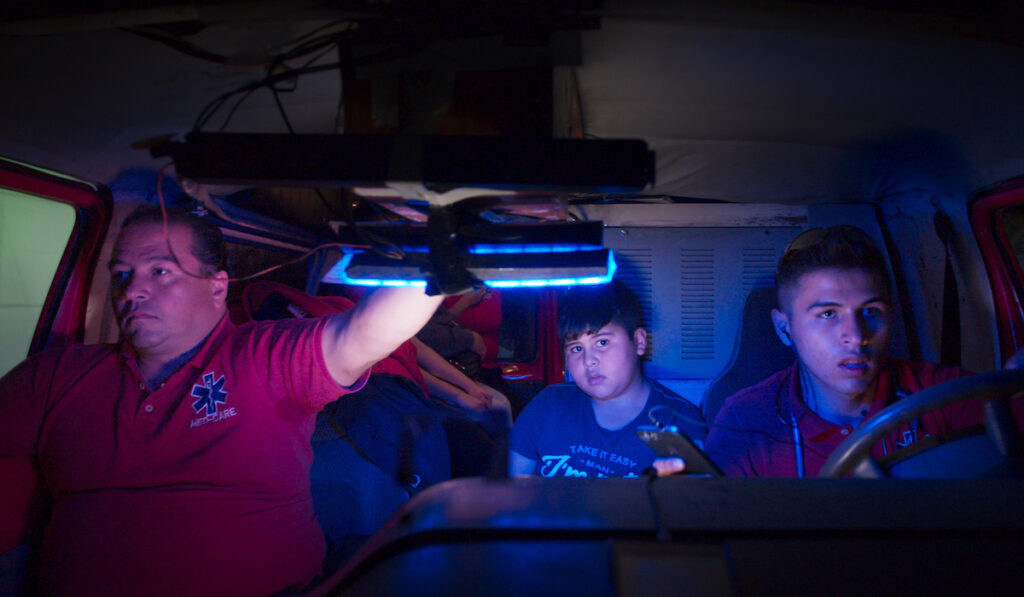In a city of nine million people, Mexico City has only 45 official ambulances. The need for immediate medical attention is largely fulfilled by non-government workers, as civilians zip around the city in their own ambulances, using their own gear, fielding life or death situations. And when they get to the hospital, that’s when they have to ask their client to pay for their service. That’s just a night in the life of the Ochoas—two young brothers, their father and a family friend—who spend their hours fielding calls for help that government ambulances can’t capture. “Midnight Family” offers an up-close perspective on their work, making for profound and thrilling cinema verite filmmaking.
The film is impeccably crafted by Luke Lorentzen, who acts as director, editor, cinematographer and producer. What matters most here is Lorentzen’s intuition—he knows during many stunning moments just where to put the camera in such close quarters, letting us observe as harrowing drama and cinematic poetry unfolds. Along with the documentary’s lack of talking head interviews and traditional establishing shots, the movie plays out in a raw and unpredictable fashion. The only time when we are really aware of Lorentzen is when the Ochaos receive a call—the camera suddenly dashes from outside the van and hops in, racing along with them on their journey.
“Midnight Family” is extremely visceral in the best ways—it’s not about the gnarly nature of what the workers see (Lorentzen focuses on the workers, not the wounded), but the natural adrenaline of their shifts. The movie is matter of fact about it, focused on capturing the experience: sometimes it’s a calm night where the low pay makes them improvise the cheapest dinner, and in other moments, they are racing—against other ambulances—to someone who needs help. It’s human suffering framed as a means of opportunity, with Lorentzen using his vivid microcosm to show the horror of when a government does not prioritize the well-being of its citizens.

From 1979 to 2015, China imposed its one-child rule, forcing families to have only one child for the cause of quelling population numbers. It was devastating to the nation’s very idea of family, leading to massive numbers of abortions, baby trafficking, and a profound toll on families. The harrowing yet comprehensive documentary “One Child Nation” seeks to comprehend a government order that was so impactful, yet normalized, by parents and officials alike.
Co-directors Nanfu Wang and Jialing Zhang take a very personal approach in showing the irrevocable damage the one-child policy made, framing it around Wang’s recent entry into motherhood while she revisits the small Chinese village where she grew up. Wang uses sit-down interviews with her family members to paint a complicated image of a society that created such a common trauma among families. It is fascinating to see the movie grapple with the past as a shared experience: Some people look upon it with great regret; others dismiss it with a sense of policy, one of its more stirring aspects about a lack of control. Propaganda imagery about the policy rings throughout the movie, whether it’s a song and dance delivered by smiling faces about the value of having only one child, or giant graffiti passages enforcing the rule, cryptically spray painted on walls.
Wang and Zhang incorporate other perspectives to show the scope of it as well, like an artist who took pictures of trash heaps where he found dead fetuses, a woman who performed thousands of abortions and is now seeking a type of forgiveness by helping babies be born, and a twin whose sister was taken to America. Balancing its investigative interests with its emotional outrage, the expansive story offers a nonetheless concise picture of this “population war.” In a larger sense, it provides a stirring look at a nation that seeks to control the bodies of its women, while seeing them as second-class to men. Wang does not make any immediate comparisons to America, but the parallels are as obvious as they are significant.

This year, Sundance programmed two documentaries that featured must-hear interviews, in which victims spoke out against their celebrity assailants: “Leaving Neverland,” which put the camera on two Michael Jackson accusers, and then there’s “Untouchable,” which documents different stories from women who have been assaulted by Harvey Weinstein.
Directed by Ursula MacFarlane, “Untouchable” takes a journalist’s approach to the documentary filmmaking—more than aiming for memorable filmmaking, it values reporting the different interviews it collects from people who speak on-camera about their experiences. The women speak in sometimes extensive interviews, recollecting specific incidents that further detail Weinstein’s monstrous nature, and the way he found himself above law. These passages are assuredly powerful, as they put a face, name, and an event to accusations, making an impact like Kirby Dick’s documentary “The Hunting Ground” did about assaults on campus.
Along with its testimonies, the film does explore Weinstein’s rise to power, from being a music manager to running successful distributors with his brother, Bob Weinstein. Co-workers and some people from the film industry detail their interactions with him, his anger, behavior, and influence making it queasy any time his picture is flashed on-screen.
It’s the in-between filmmaking factors that show the doc’s weaknesses. “Untouchable” relies too heavily on B-roll of overhead city shots, or an ominous black SUV driving around NYC, and even a slow walk through a hotel room, as if noting the way he haunts the places he once freely roamed. These directorial decisions only highlight just how much the doc has to say with its content, but not as much with its form.












